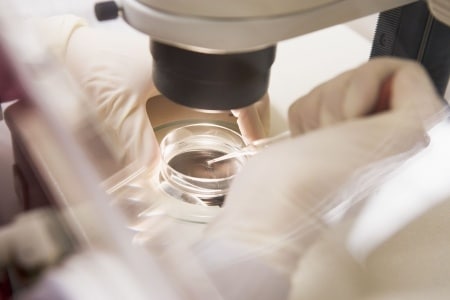Failure of implantation: it’s an all-to-common issue in IVF. To counter this issue, IVF specialists often implant more than one embryo to improve the chances of successful pregnancy. But one research group from the UK Universities of Southampton and Warwick, along with the University of Utrect in the Netherlands decided to take a different approach to this issue, and they believe they may have solved the mystery of why some embryos just don’t implant.
“One in six couples will experience some sort of infertility, which can be both frustrating and daunting, and many will turn to IVF,” Professor Nick Macklon, professor of Gynecology and Obstetrics at the University of Southampton said when presenting the findings earlier this week at the University of Southampton’s 2013 Institute for Life Sciences Conference.
Professor Macklon, who is also the director of the Complete Fertility Center at Southampton and colleagues looked for new clues as to how or why the endometrium (uterus) chooses an embryo. What they found may very well change the way that IVF is carried out.
After incubating fluid in which embryos had been cultured with cells from the connective tissue of the endometrium (stromal cells), researchers found a huge reaction from the endometrial genes when the fluid contained poor quality embryos. Yet, when the fluid contained a high-quality embryo, no reaction was noted.
The down-regulated genes in the study are known to be important in allowing embryos to implant in the uterus. And it seemed that these genes searched for chemical signals. When the amount of trypsin, a common enzyme that the embryo gives off, was low or not detected, the genes involved in allowing the embryo to embed in the uterus seemed to be silenced. As a result, the embryo was left to disintegrate, thereby resetting cycle. However, when adequate levels of trypsin were detected, the genes reacted.
This was replicated by the team in live animals. Again taking fluid that contained good and poor quality embryos, researchers implanted into the uteruses of life mice. Results were confirmed to be the same.
As the first of its kind, the study also offers up a possible explanation as to why high levels of natural killer (NK) cells in the uterus can sometimes result in miscarriage. High levels of NK cells were found in the endometrium, and they were said to be a sign of insufficient production of steroids, which in turn leads to reduced formation of fats and vitamins that are essential for pregnancy nutrition. This information could be especially helpful in treating women who suffer from recurrent miscarriage.
Related Articles:
- Less Complex, More Economical IVF Technique Being Prepared for Use in Developing Countries
- Number of Infertile Couples has Dropped in US says New study
- Pregnancy Duration Varies as Much as Five Weeks, Study Says







